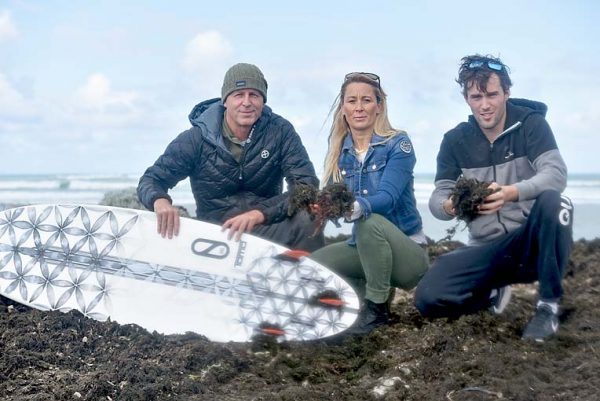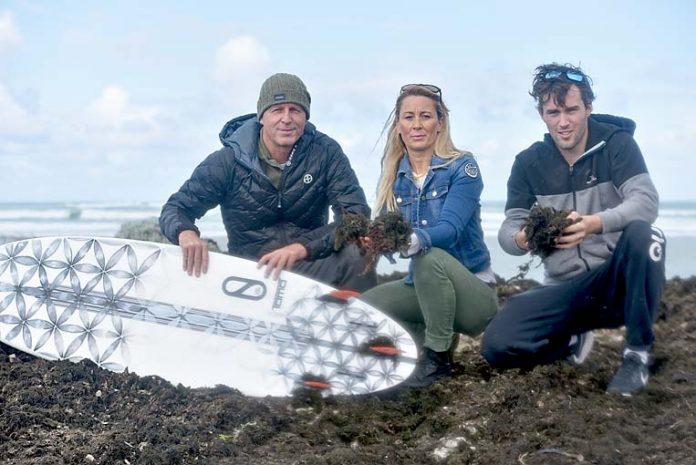
THE Port MacDonnell multi-million dollar rock lobster processing sector has warned the industry will be potentially tarnished if thousands of cubic metres of rotting seaweed is dumped along a local beach.
This follows Grant District Council and the transport department this week beginning the mammoth task of removing the built-up foul-smelling seaweed from along the Port MacDonnell foreshore.
The seaweed is earmarked to be potentially dumped along a beach or high water mark near Racecourse Bay, where seafood processors access “pristine seawater” for their rock lobster tanks.
Amid the stink brewing over the move, council says it has been directed by coastal environmental regulators to place the material back onto a beach.
Contractors have started stockpiling the seaweed at the location just two weeks from the start of the 2018/19 commercial rock lobster fishing season.
High mortality rates and polluted rock lobsters are among the fears raised yesterday by the concerned sector, which was yesterday rallying against the move.
Some seaweed has already been dumped along the high water mark as a trial, which is also creating a backlash from nearby Racecourse Bay residents.
While council has investigated taking the seaweed out of the ecosystem, the Coastal Protection Board SA has directed it to relocate the organic material on to another beach.
Tom Ryan – speaking on behalf of the district’s processing sector – warned the move could have serious ramifications on the important export industry.
“At the moment we have the number one rock lobster product in the world given our pristine water, best fish and quality,” Mr Ryan said.
He said he was “gobsmacked” authorities were considering dumping such a large amount of seaweed at the location where factories collected seawater.
Mr Ryan said he was also stunned authorities was stockpiling the seaweed so close to the launch of the fishing season.
“This means we may not be able to access any seawater for the industry, which has more than 1200 tonne of quota in the southern zone,” he said.
He warned the seaweed could pollute the water, which could diminish the quality of the rock lobster being exported to China.
Alarmingly, Mr Ryan foreshadowed it could also lead to climbing mortality rates in the holding tanks.
While seawater could be collected near Blackfellow Caves, this is not considered a viable option for the Port MacDonnell processing sector.
Port MacDonnell commercial fisher and recreational surfer Jeremy Ievins – who inspected the site yesterday – also harboured concerns.
He questioned why environmental regulators would not allow the material to be taken to a processor to be made into fertiliser.
“In the past they have found an alternative use for it,” Mr Ievins explained.
Mr Ievins also raised concerns the dumped seaweed would ruin the popular surfing beach and the trucks travelling on the foreshore would destroy the native flora along the foreshore.
But council works manager Adrian Schutz yesterday called for calm among the industry, explaining council was not planning to dump large amounts of seaweed immediately onto the beach or the high water mark.
“Council has no intentions of polluting water that seafood factories use,” Mr Schutz said.
“We want to work with the fish factories to eliminate any possibility of affecting the water resource.”
The council employee said it was “unknown” at this stage whether the relocation of the seaweed would impact on water quality.
He said council was stockpiling the seaweed off a beach near Racecourse Bay and would monitor the small seaweed trial on the high water mark.
Mr Schutz said the South Australian Coastal Protection Board indicated it wanted it placed back onto a beach, which closed avenues for the material to be used for mulch or other alternatives.
“It is not like we can transport it to a cliff and push it off over at the lighthouse area because it would be unsafe,” Mr Schutz said.
Council chose the beach near Racecourse Bay given it had the only truck access in the Port MacDonnell vicinity.
He said the rough coastline, including cliffs, limited access for trucks.
Mr Schutz said seaweed was being removed from the foreshore given the material was causing a stench and was environmentally unappealing.
Importantly, he said the seaweed was being removed because it was building up within the breakwater, which was causing havoc with boat motors.








